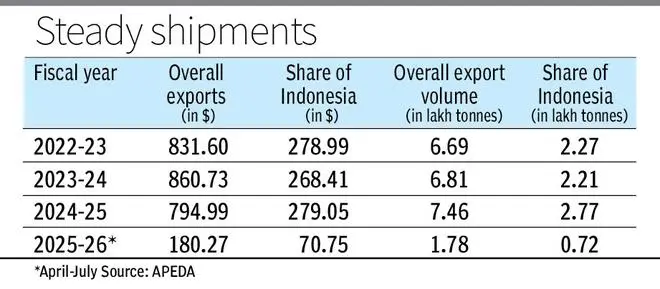Indonesia suspends Indian groundnut imports for higher aflatoxin levels

Indonesia accounts for one-third of the total groundnuts exported from India, with an annual volume of over 2.25 lakh tonnes valued at $274 million
| Photo Credit:
MURALI KUMAR K
Indonesia has suspended the import of groundnuts from India for non-compliance with quality standards, particularly due to higher aflatoxin levels.
In a notification issued on August 27, the Indonesian Quarantine Authority (IQA) said the order suspending groundnut imports will come into force after seven days (September 3). It said consignments with bills of lading up to 7 days from the date the order was issued would be accepted. However, the shipments will be subject to inspection and retesting on their entry into Indonesia.
The Agricultural and Processed Food Export Development Authority (APEDA), which monitors exports of farm products from the country, said all groundnut shipments to Indonesia will be “strictly checked” for the next seven days. “If any kind of deficiency is found in it, the entire shipment will be rejected. This measure will remain in force until a new system is issued by IQA,” it said.

APEDA advisory
The development comes within four months of APEDA issuing an advisory asking testing laboratories to strictly follow the procedures for the export of peanuts and peanut products. It asked them to focus on the requirements and procedure to be followed for sampling, analysis and shipment stuffing.
The advisory was issued after IQA said it was stepping up monitoring of high aflatoxin levels in peanuts and wheat imported from India. The authority registered 17 food testing labs in mid-April to conduct testing on agri-products exported from India.
Indonesia accounts for one-third of the total groundnuts exported from India, with an annual volume of over 2.25 lakh tonnes valued at $274 million. (See table)
In 2022, Indonesia suspended imports of agricultural products from India for failing to register its testing laboratories and a higher level of aflatoxin in groundnuts.
Liberal norms
Indonesia has adopted the maximum level permitted for the presence of aflatoxin by the Codex Alimentarius Commission (CAC) in peanuts and peanut products for direct human consumption or use as an ingredient. This is 15 parts per billion (ppb or µg/kg). This is a little liberal compared with the European Union standards of 4 ppb.
Aflatoxins are considered poisonous compounds that are produced by the Aspergillus flavus and Aspergillus parasiticus fungi, which contaminate peanuts in warm, humid conditions. These toxins are reported to be genotoxic, carcinogenic, and pose risks to human and animal health, with Aflatoxin B1 being a potent liver carcinogen.
Trade sources said the issue is with testing laboratories with some being set up in small rooms with no proper equipment. “Indonesian officials had visited one of the labs in Chennai and expressed concern over the way it was functioning,” said the source, who did not wish to be identified.
Basmati too hit
The source said India was exporting a good volume of groundnuts to Europe, but the aflatoxin issue cropped up. As a result, India lost its hold in the European Union.
“The issue cropped up in basmati rice exports too in 2017. It resulted in loss of market share in the EU, again,” the source said, adding that Indonesia has been frequently raising the issue of aflatoxin in peanuts.
“Probably, APEDA needs to strengthen its monitoring. It has accept its responsibility for this,” the source said.
Published on August 29, 2025




